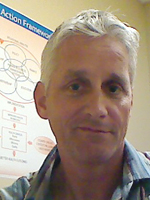 At my hotel in Accra, Ghana, there's a buzz of activity throughout the first week in October, as the national football team—the Black Stars of Ghana—converged for the first home match since their successful World Cup campaign in South Africa. For me, this trip was also a homecoming. Until this past year when I’ve resided in Washington, DC, I’d spent the better part of the last 20 years living in Africa.
At my hotel in Accra, Ghana, there's a buzz of activity throughout the first week in October, as the national football team—the Black Stars of Ghana—converged for the first home match since their successful World Cup campaign in South Africa. For me, this trip was also a homecoming. Until this past year when I’ve resided in Washington, DC, I’d spent the better part of the last 20 years living in Africa.
However, my trip to Ghana with colleague Anne Wilson was not for football. Our brief was to look at preservice training of the health workforce, with a busy schedule of discussions, meetings, and field visits with stakeholders and implementing partners—including the Ministry of Health, Ghana Health Service, the Health Workforce Observatory, and the main health training schools and teaching hospitals. Read more »
